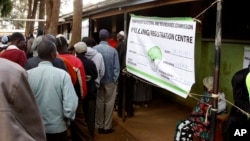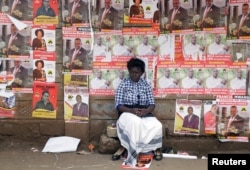Kenyans will vote in August for posts at all levels of government, from the president down to local officials. But there is something different on the ballot this year: a surge in the number of independent candidates. A quarter of the more than 15,000 people cleared to run for office by the electoral commission are independent.
Peter Kenneth is among them. Kenneth is one of five candidates — three of whom are independents — challenging the incumbent in Kenya for the governorship of Nairobi County.
Kenneth, a former member of Parliament, ran for president in 2013 under the banner of the Kenya National Congress; however, he didn't make the cut during this year's primaries, so he is running as an independent.
"The big parties conspire against individuals," he said, "but I think you can see with this particular sham, it was across the board in many of the leading political parties. So, you have more independent candidates than the political parties have and what will be a lasting ramification is that in [the] future, people will not go for party nominations."
That remains to be seen. These are only the second nationwide elections since 2010, when Kenya's new constitution allowed people to run as independents.
Some voters, such as Okath Obado, are embracing the added choice.
"It's not about party because at the end of the day, party will not sort out my issues," Obado said. "I have to look at a leader who can look at the nature of the young people, a leader who can fight for the environment, education and security."
The ruling Jubilee coalition and the opposition National Super Alliance currently dominate the political landscape. But this year's primaries were plagued with allegations of irregularities and favoritism, leading to court challenges.
The governor of Kiambu County, William Kabogo, broke off from Jubilee to run for re-election. He now chairs the newly formed Kenya Alliance of Independent Candidates, which he says counts nearly 5,000 members.
"People are beginning to now think about candidates and not forums, not parties, not euphoria," Kabogo said. "And if this happens successfully, in terms of the number of people who we get into parliament or the number of people who will succeed in this general election having participated as independent candidates, then that will create a different level in terms of how mature we are in electioneering."
But analysts say the rise of independents is not enough to alter Kenya's political landscape. Political analyst Levi Obonyo, a professor at Daystar University, says many Kenyans still choose parties and candidates based on ethnicity.
"In terms of the arrival into the space of independents, that possibly it might be able to raise the debate simply beyond the ethnic orientation, and if that happens, we have not yet seen it happen strongly," Obonyo said, "because the independents who come from specific regions have also tended to fall simply into the same alignments and carry the same ethnic conversations."
Kenyans will have their say at the polls August 8.





